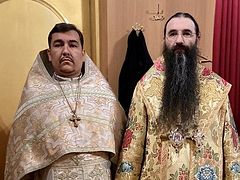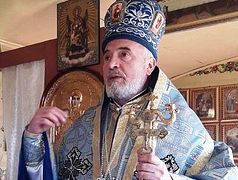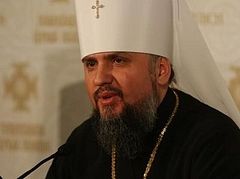Fălești, Moldova, February 20, 2020
 Photo: pravoslavie.ru The “hierarch” who left the “Orthodox Church of Ukraine” and returned to Philaret Denisenko’s “Kiev Patriarchate” has explained his decision, accusing Epiphany Dumenko, the head of the OCU, of a number of deceptions.
Photo: pravoslavie.ru The “hierarch” who left the “Orthodox Church of Ukraine” and returned to Philaret Denisenko’s “Kiev Patriarchate” has explained his decision, accusing Epiphany Dumenko, the head of the OCU, of a number of deceptions.
According to “Bishop” Philaret Panku of Fălești and East Moldova, “Metropolitan” Epiphany Dumenko deceived the members of December 2018’s “unification council,” at which the OCU was created, by deciding important ecclesiastical matters together only with a narrow group of “bishops” surrounding him.
Philaret Panku’s explanation is published on the official “Kiev Patriarchate” website.
“We, as participants of the founding council of the OCU on December 15, 2018, were promised that a Local Council of the new church would be held soon after the council, which would resolve all the important issues. A year has passed, and there has been no Local Council and none is planned,” Philaret said.
A Local Council would include every “hierarch,” as well as clerical and lay representatives from the parishes.
“Everything is decided according the tradition of the Church of Constantinople—through the decision of the Synod, which is governed by Metropolitan Epiphany. In the OCU, behind the external conciliarity is hidden the control of the narrow circle of Metropolitan Epiphany,” Philaret Panku writes.
He also notes that Epiphany gave him the fake episcopal title of Belgorod-Dniester to cover the fact that he was actually administering a diocese outside of Ukraine, in Moldova, as the tomos of autocephaly granted by Constantinople forbids the OCU from having any parishes abroad.
“Of course, I don’t have any communities or monasteries there, and I have nothing to do with Odessa Region,” Panku said. “With this title, he wanted to hide the truth that the OCU has a diocese with communities and monasteries in Moldova, that is, outside the borders of Ukraine.”
“Thanks to the leadership of the OCU, I, along with my diocese, found myself in an absurd position. It became clear that there would be no development or future for the diocese,” the schismatic hierarch writes.
As he explains, he and his clergy and parishioners realized they cannot stay in the OCU given that the tomos does not grant true independence, but fixes the dependence of the OCU upon the Patriarchate of Constantinople.
“We do not understand why the Ukrainian Orthodox Church should be so humiliated, unlike other Local Churches. We are convinced that the Ukrainian Orthodox Church, as an ancient Apostolic Church founded by the Apostle Andrew himself, was raised to the Patriarchal status in 1990, and now in the structure of the OCU it was actually reduced to a metropolis of the Patriarchate of Constantinople,” Philaret writes.
Moreover, the OCU has failed to unite Ukrainians, he emphasizes, and the last straw, he continues, was the “hypocritical and unfair treatment of His Holiness Patriarch Philaret, who was for all of us, the bishops of the Ukrainian Orthodox Church of the Kiev Patriarchate, a spiritual father and a merciful brother.”




